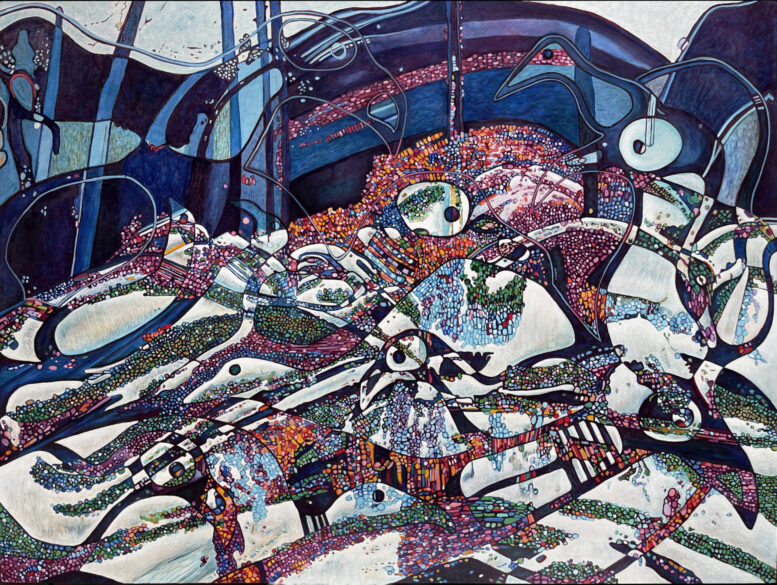Reception and gallery talk: January 23, 5-7 pm
Artist Statement
“Kawii Otinum” translates to “Reclaim” in Michif, the distinctive language of the native Métis in North America. Although only recently officially acknowledged by the Canadian government following years of suppression, the Métis Nation is fervently reclaiming its rich cultural heritage. The recent acknowledgment of my family as members marks the culmination of a lifelong struggle to regain our birthright, which was eroded through generations of systematic cultural suppression. For example, my grandmother was forced to attend a distant and notorious boarding school for re-education, severing generational cultural and familial ties. Since the antidote to the erasure of identity is the uniquely indigenous experience of reclamation, this artwork is essential in that process.
These paintings merge iconic depictions of North American lands by 19th-century colonial plein-air painters like ‘The Group of Seven’ with narrative paintings of the original peoples of North America. Employing digital algorithms, native motifs, like the buffalo that embodies spiritual beliefs, intertwine with Eurocentric environmental depictions, breaking them down and methodically reconstructing the scenes. The consequent paintings cause the land to quaver as the potency of the autochthonous imagery reshapes the Eurocentric vision, capturing celebratory moments where the land reconnects with its first partnerships.
Analogous to beading or quill work, intricate details echo a slow, meditative process that strengthens indigenous healing through creation. The new visual language seeks to encapsulate the multilayered identities of the land, previously oversimplified by foreign dominance.
Complementing the paintings, sound sculptures further the repossession of the first people’s traditions, often appropriated for European products. These artworks subtly whisper sounds and stories of generations whose simple existence is an act of resilience and rebellion. Each artwork extends the chronicles of cultural reclamation as layered elements that work to disintegrate the devastating lens of colonization. This multifaceted approach makes suppressed stories easier to identify, acknowledge, and understand.
Artist Bio
Canadian Indigenous artist Wendy DesChene graduated with an MFA in Painting from Tyler School of Art and immediately incorporated materials that would support activism. Weary of the limitations placed on art by institutions, she fostered audience participation in her large installations. The outcome, a large collaborative community exhibition titled WYSIWYG, was unleashed onto a dozen different locations, including the Art League of Houston, Minnesota State University, the Art Academy of Cincinnati, and The Henry Street Settlement of New York. Her explorations have been honored with several Canada Council Travel Grants and a recent Verdant Fund Grant.
In addition, variations of collaborative-based projects were showcased at the Soap Factory and Tomio Koyama Gallery of Japan. Her longstanding collaborative work as PlantBot Genetics with artist Jeff Schmuki has been awarded NEA and Pulitzer Foundation Grants for exhibitions and programming at the Carnegie Museum of Art in Pittsburgh, The Goethe Institute in Egypt, the Bach Modern in Austria, the New Gallery of Canada, and Marfa Dialogues in St. Louis.
Wendy continues to critique art world structures, systems, and protocols through interventionist strategies, including placing works on the street or within institutions without permission. She has commandeered the world’s most prestigious art institutions as her studio and target using projectors, stickers, art liberation tactics, and videos. Documented work from her “Unauthorized Series” has been exhibited in numerous international exhibitions, including the Sanlun Yishu Project in Beijing, China, The Ice Box Project Space in Philadelphia, PA, and the International Center for Art and Design in Albuquerque, New Mexico.
Due to racist and outdated laws in Canada, her family has only recently been able to reclaim their indigenous status as part of the Métis Nation. As a large part of belonging to a modern First Nation is finding paths back, new artworks will focus on reclamation and investigating what it means to be indigenous. Painting and drawings from past bodies of work have traveled to the Drawing Center in New York, the McColl Center for Art and Innovation in Charlotte, and other well-regarded venues. In addition, she has completed many international residency programs, including The American Academy in Rome, Jentel, I-Park, Pouch Cove Canada, the Hafnarborg Art Museum Iceland, The Atlantic Center for the Arts, KulttuuriKauppila Art Center Finland, Buitenwerkplats Netherlands, Airgentum Spain, and Mauser Eco House Costa Rica. Currently, she is an Endowed Professor at Auburn University.
Admission: Free
Gallery Hours: Monday-Friday, 8 am-5 pm
A weeknight or daytime permit is now required after 5:00 pm on weekdays. There is no permit needed from 5:00 pm Friday through 7:30 am Monday. A $1.00 one-night pass is available in selected lots. More information can be found at Weeknight Parking.
Artist website: https://www.wendydeschene.ca/
For more information, please contact Roxana Perez-Mendez at rpm@email.unc.edu
Image: Lii Zway (Geese), oil on polyacrylic mounted on wood panels, 4′ x 3′

